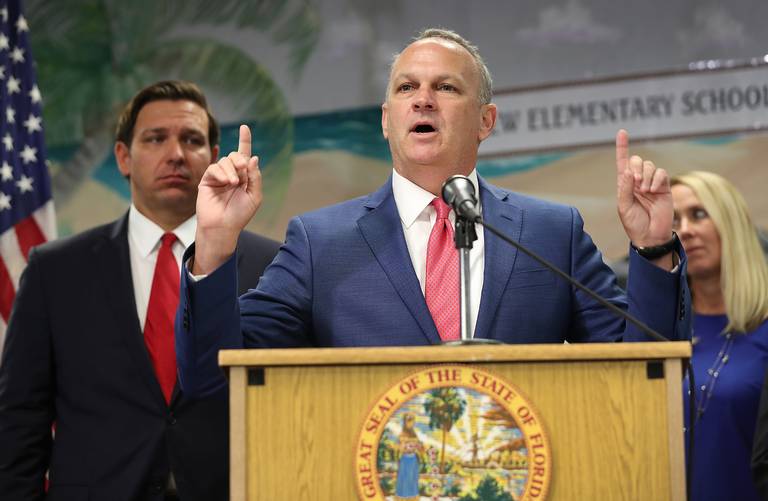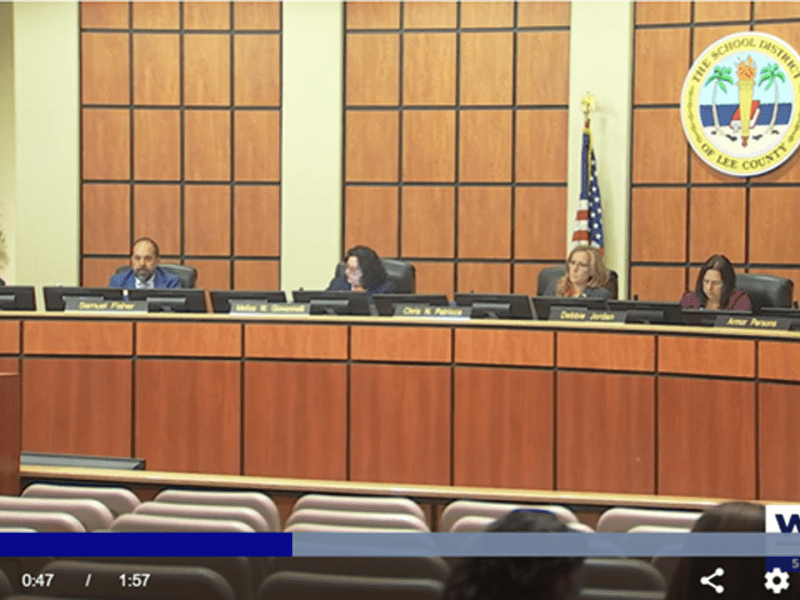Gov. DeSantis, Richard Corcoran join educators to tout advantages of progress monitoring
Florida Politics | By Renzo Downey | March 17, 2022
‘If there was a silver lining of COVID, I think this bill is one of the silver linings.’
Underscored by a symbolic bill signing, Gov. Ron DeSantis and Education Commissioner Richard Corcoran on Thursday made the third leg of their education victory lap in as many days since Session ended.
Sporting an Irish-green tie before a pool of reporters at Florosa Elementary School in Okaloosa County, the Republican Governor continued touting the end of state standardized testing in Florida, as outlined in a bill (SB 1048) he signed into law Tuesday. The proposal, which the Governor signed a second time Thursday, will replace the annual Florida Standards Assessment with a computer-based progress monitoring screening in English language arts and mathematics.
DeSantis and Corcoran said the idea to eliminate the FSA began in spring 2020, when schools shuttered for the COVID-19 pandemic. The Governor recalled that he wanted to get classrooms open quickly, but Corcoran said the end of April and May are set aside for testing, which struck the Governor as too long a time period.
“Whenever I’d cram for a test, yeah, maybe I would pass the test. But then it goes away. It’s not really knowledge that you’re carrying with it,” DeSantis said. “I think we’re trying to build a stronger foundation.”
The progress monitoring, spaced three times a year, will begin in the 2022-23 school year for students in pre-kindergarten through 10th grade. The first two tests are intended to give students, teachers and parents guidance on how to work on the students’ weaknesses. The final “summative” test, late in the school year, would still provide results in time for students to use summer school to meet standards.
Additionally, the bill places a cap on class time dedicated to state testing at 5%.
The DeSantis administration has also highlighted progress monitoring against the backdrop of students’ poor academic performance during and after distance learning.
Fifth grade teacher Monique Stinson said 6% of her students were at grade level in August after returning to classrooms. After using progress monitoring to track her students’ academic needs, the FSA at the end of that school year showed 76% of her students were proficient.
“Progress monitoring is about communicating with all stakeholders, including the child, to create a plan to assist students in closing their learning gaps and or accelerate their learning,” Stinson said. “When children are aware where they are, what their goals are and how they can read those goals, they are more likely to work to get there.”
While DeSantis and Corcoran have been crossing the state to tout the legislation since Session ended on Monday, the events have been a bit of a farewell tour for the Education Commissioner. Corcoran, who became a controversial figure alongside DeSantis in their push to return classrooms to normal during the pandemic, is departing the DeSantis administration before the end of the school year.
“If there was a silver lining of COVID, I think this bill is one of the silver linings,” Corcoran said.
When DeSantis and Corcoranunveiled the proposal in September, the Governor said progress monitoring was a big priority for the administration. The bill also builds on legislation passed last year that created progress monitoring between kindergarten and eighth grade. This year’s measure extends the progress monitoring to grades nine and 10.
Department of Education Senior Chancellor Jacob Oliva, who oversees the department’s public school operations, told a House subcommittee last month that the quick turnaround time for progress monitoring results will keep parents, teachers and students informed of students’ learning progress in real-time.
“It’s going to help drive instruction, and then that end-of-year summative assessment’s not a surprise,” Oliva said. “We should know how the students are doing, and we should be able to provide opportunities for acceleration.”
Hialeah Republican Sen. Manny Díaz Jr. sponsored the bill, which originated after DeSantis rolled out the proposal. The Senate passed the bill unanimously earlier this month, and the House approved it 83-31, with six House Democrats voting with Republicans in the majority.
Both Díaz and the House sponsor, the now-former Orlando Republican Rep. Rene Plasencia, are former teachers and coaches.
Ahead of the 2022 Session, Plasencia told Florida Politics the likeliest opposition is from people who want to see the reform go further. His prediction has appeared to come true.
Democrats in the House mostly aligned themselves against the bill during the committee process, arguing it still creates high-stakes testing.
Teachers’ unions, notably the Florida Education Association, support the change.
If approved, the legislation would take effect in July.






